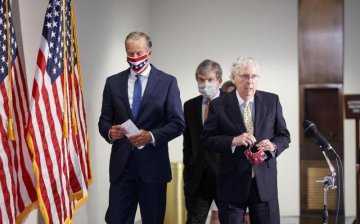WASHINGTON, Aug. 4 (Xinhua) -- The White House and congressional Democrats aim to strike a deal on the next COVID-19 relief bill by the end of this week, while the two sides remain far apart on some important issues, according to U.S. media.
"We're not at the point of being close to a deal, but we did try to agree to set a timeline," U.S. Treasury Secretary Steven Mnuchin said on Tuesday after meeting with House Speaker Nancy Pelosi and Senate Democratic leader Chuck Schumer, Bloomberg reported.
"We're going to try to reach an overall agreement, if we can get one, by the end of this week -- so that legislation could then pass next week," Mnuchin said.
During an interview with PBS NewsHour on Tuesday evening, Pelosi also said that she hoped a deal could be reached this week. "That would be the plan... But we have to have an agreement and we will have an agreement," she said.
Earlier in the day, Schumer said that the White House and Democrats are "still far away" on a lot of important issues.
"In my view, the fundamental disagreement is the scope and depth of the problem and its solution. This is the greatest crisis America has faced in 75 years economically, in a hundred years health-wise. We believe it needs a big, bold solution," Schumer told reporters after meeting with Mnuchin and White House Chief of Staff Mark Meadows.
"They are still wrapped in this idea that the government shouldn't do much and leave it to the private sector. And it just doesn't work. They're also not unified. They admit that there are a large number of the Republicans in the Senate will not vote for anything," Schumer said.
As negotiations for the new relief package stall, the extra 600-U.S. dollar unemployment benefits per week for roughly 30 million Americans expired on Friday.
Republican and Democratic lawmakers, facing immense pressure to reach a deal to salvage the economy from COVID-19, have blamed each other for failing to make progress.
The U.S. economy contracted at an annual rate of 32.9 percent in the second quarter of the year, the steepest decline since the government began keeping records in 1947, the Commerce Department reported last week.



















Latest comments